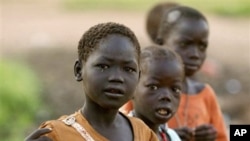The capital of semi-autonomous south Sudan has seen amazing growth in the past five years. That growth has led many to come to the city in search of work, education and a better life. But as a group of boys, who traveled there from the eastern end of the country, learned – even there opportunities are hard to find.
Konyo Konyo is one of a few thriving markets in Southern Sudan's capital city, Juba. It was in this market that Benneth Morris met two young boys from Kapoeta, a region dominated by cattle herding and small farms.
"And then I asked them about, do they go to school? They said to me no, they do not go to school. And then I said, what about if we can arrange or open a class for you to study? They said there is no problem. Why did you start working with these children for nothing? Because this is my country and when I do not see these children going to school I do not feel OK. They are my brothers."
Morris started teaching street kids how to paint and make sculptures out of clay earlier this year. A 2009 study found there were about 1,200 kids either living on the streets or supporting themselves during the day. For the boys that came from Kapoeta, the land of the Toposa tribe, life in Juba can be especially hard, says Morris.
"I went to one of the hospitals here because I wanted to make an agreement with them. I said I want to bring some street children here if they are sick. They said, 'Oh, these Toposa boys, no, no, no, they are thieves.' They have a prejudice they call them thieves and all this."
According to Major General Daniel Deng, the chairperson of the Southern Sudan Bureau for Community Security and Small Arms Control, it is the region of Southern Sudan that borders Kenya, Ethiopia and Uganda, where these boys come from, where cattle rustling and the spread of small arms are causing the biggest problem for authorities here.
"So the problem now is a cow and a gun, that is the basic problem. How do we transform their livelihood, or lifestyle, from a cow and a gun to something else?"
Until the government of what may soon be an independent Southern Sudan can answer that question, boys from the east will keep making the two-day trip to Juba, hanging onto the backs of trucks loaded with cattle from one town to the next, or paying cars making the trip to the capital.
One such boy is Philip. He spends his days behind a secondary school near the market with a group of about 60 other Toposa boys.
"When we get something, we share together, clean water we share together, we sleep together," says he.
The boys sleep outside, in a gravel soccer field near the market. Philip came to Juba two years ago, an orphan whose parents were killed in a cattle raid. He came looking for a place to go to school and to make a bit of money.
"We do not have the sponsor who will put us in a house, put us in schools, but we are the street people," says Philip.
Eventually, a non-governmental organization in Juba, called the Japanese Center for Conflict Prevention, hired Morris to keep teaching kids how to paint. The Japanese NGO and another, called Confident Children out of Conflict, are the only ones running programs for the 1,200 kids on Juba's streets.
There are less than two months left before voters in south Sudan decide whether or not they will become an independent nation. Right now, with the vote still in doubt, the five-year-old government of the semi-autonomous south is putting all its energy into preparations for the referendum on independence. There is also a plan for how the government hopes to help these kids.
Peter Sukole Buni is an adviser to the government's Minister of Gender, Child and Social Welfare. He said the first option will be to find their parents and reunite them.
"If you keep [them] in an institution, then [they] will be missing that link and we should resist that."
But as with so many of the government's plans, it will have to wait until after the referendum and the independence that is likely to follow.
No Place to Call Home: Street Children in Juba, Sudan




